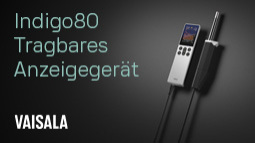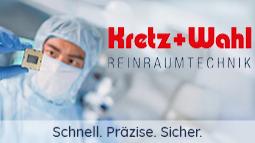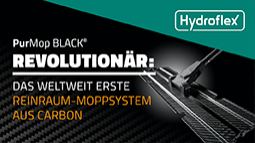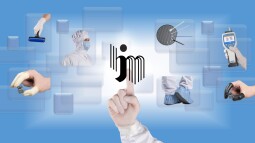- Injection moulding
arburgXvision: "Savings through hidden benefits! Savings - there's still some to be had"
- Fifth live broadcast: Tips and savings potential for efficient injection moulding processes
- In theory and in practice: optimising processes using a host computer system and assistance functions
- All eyes on digitalisation: networked production processes and machines improve productivity
The fifth broadcast by arburgXvision entitled "Savings through hidden benefits! Savings – there's still some to be had", was all about the exciting question of how productivity can be optimised by bringing together technology, organisation and digitalisation in the ideal manner. Around 400 viewers tuned in live to the interactive Arburg TV broadcast online. Arburg experts Christoph Kiefer, Team Manager for Technical & Commercial Sales Support, and Dr Thomas Walther, Head of Application & Process Development, were guests in the studio. What's more, there were two live streams from the Arburg Training Center, providing specific tips on potential savings.
The programme highlighted both in theory and in practice how processes can be optimised using the Arburg host computer system ALS and digitally networked machines, and what role a "smart" machine controller plays in this. In interactive polls, the audience answered questions on how important this is for everyday injection moulding operations.
Interactive polls
Around 64 percent of German and 50 percent of international viewers felt that the topic of cost savings was very important. Almost every company is already looking specifically for hidden opportunities to make savings, also known as hidden benefits. Two out of three German companies, but only one in four international companies, are already using software tools for production organisation purposes. German viewers felt that the work planning function and reliable processes offered the greatest potential for increasing profit margins in equal measure (46 percent in each case). Among international participants, reliable processes were streets ahead (75 percent), followed by transparency (25 percent).
Digitalisation is the only way
Christoph Kiefer's key message was: "There’s no way around digitalisation when it comes to a notable improvement of efficiency in your production!“. One of the challenges is the acute shortage of skilled workers. For example, in Germany, only 1,500 people started apprenticeships to become process mechanics in the field of plastics and rubber technology in 2020 – almost 40 percent fewer than in 2018. Therefore, digital systems have an even greater role to play in assisting specialists with process optimisation. Christoph Kiefer presented the Arburg host computer system ALS as a digital representation of the entire injection moulding production system, and went into detail about how this facilitates efficient production management along the entire value chain. Viewers learned how they can use it to make organisation, processes and procedures transparent at production level, analyse them and monitor them in real time, and use capacity to the full. In addition, injection moulding machines and systems from other manufacturers can be integrated into Arburg's own MES and mould programs can be managed centrally. "Digital production management is a kind of navigator that reliably alerts us to impending faults and offers enormous potential in terms of saving time and cutting costs," Christoph Kiefer emphasised. "In a production system with 20 injection moulding machines and ten daily set-up processes, around 250 hours of additional production time can be gained every year simply by providing all the necessary tools and peripheral devices," explains the expert. Furthermore, automatic recording and documentation of the machine and order counters saves close to the entire working time of an employee over the course of the year; an employee who can, instead, be assigned to more productive activities.
Reliable processes thanks to "smart" assistance functions
"A solid process – that’s what I’m living for!" emphasised application technology expert Dr Thomas Walther. "Because if it's not solid and reliable, it cannot be optimised." He mentioned that the digitalised machine with its "smart" assistance functions was a quality monitor and an essential component for tapping into hidden benefits. This would result in reproducible processes, meaning that good parts could be manufactured efficiently and time and money could be saved. "All of the devices and components that have an impact on the process can be parametrised, adjusted and monitored via the central machine controller." He demonstrated how the machine communicates via the OPC UA and Euromap interfaces and exchanges data with the peripheral equipment and higher-level systems. Temperature control devices, dosing systems and hot runner controllers were the application examples that he mentioned. Robotic systems that are fully integrated into the controller, thereby facilitating significant cycle time reductions, are the icing on the cake. The expert also explained how states can be monitored to ensure stable production of good parts – for example, by displaying signal curves and envelope curves as well as a controlled soft start when restarting a machine. The question of how the mould status can be "sensed" - for example, using networked temperature control devices, flow value measurements and ejector force recording, was of particular interest.
Important savings opportunities presented live
During the first live stream from the Training Center in Lossburg, ALS expert Peter Kowalewski provided specific practical tips regarding the host computer system and detailed planning. He explained how the planning chart can be used to assign production orders, moulds and peripheral equipment to individual machines and adapt them to the current workload. The viewers also learned how to load orders directly onto the machine and track part production in real time using a mobile machine terminal. Finally, Peter Kowaleswki addressed the wealth of analytical possibilities.
In the second live stream, Philipp Jarosch, Team Manager of the Arburg injection moulding facility, demonstrated how cycle times can be significantly reduced by optimising the production process. One example was to move ejectors at the same time as opening and closing the mould. He also talked about how to synchronise robotic systems that are integrated into the Gestica or Selogica control systems.
Knowing where you can make savings
In the concluding round of discussions with presenter Guido Marschall, Christoph Kiefer summarised the following key finding: "In Germany, a far greater number of customers are already using software tools to optimise their production systems because cost pressure started to set in here before it did in other countries. But this trend is spreading throughout the world – our customers there are becoming more and more open to the topic of digitalisation." Dr Thomas Walther underlined this point: "The automotive industry in particular is under enormous cost pressure. For this reason, our application technology consultants provide assistance even before the purchase is made so as to get the best out of each machine and application." Besides the technology, optimised organisational processes are the most important factor in getting the most out of existing capacity and lowering costs further still.
Next broadcast: 24 June 2021
On Thursday, 24 June 2021, it's time for another episode of "arburgXvision". "Totally digital – arburgXworld in detail" is the title of the next topic. Guests on the sixth show are Arburg experts Benjamin Franz, Team Manager Digital Solutions, and Stephan Reich, Head of IT Application Development. They will address the added value provided by digital customer services and networked machines and will show viewers how the arburgXworld customer portal makes operational sequences easier and quicker along the entire value chain. In addition, practical tips will be provided during two live streams from the Arburg Customer Center in Lossburg.
If you would like to attend and stay up to date with the series, visit our website www.arburgXvision.com and complete our quick and easy one-time registration process. Registration also includes access to all events and to the Media Center, where all episodes will be available to watch on demand shortly after broadcast.
ARBURG GmbH + Co KG
72290 Loßburg
Germany









